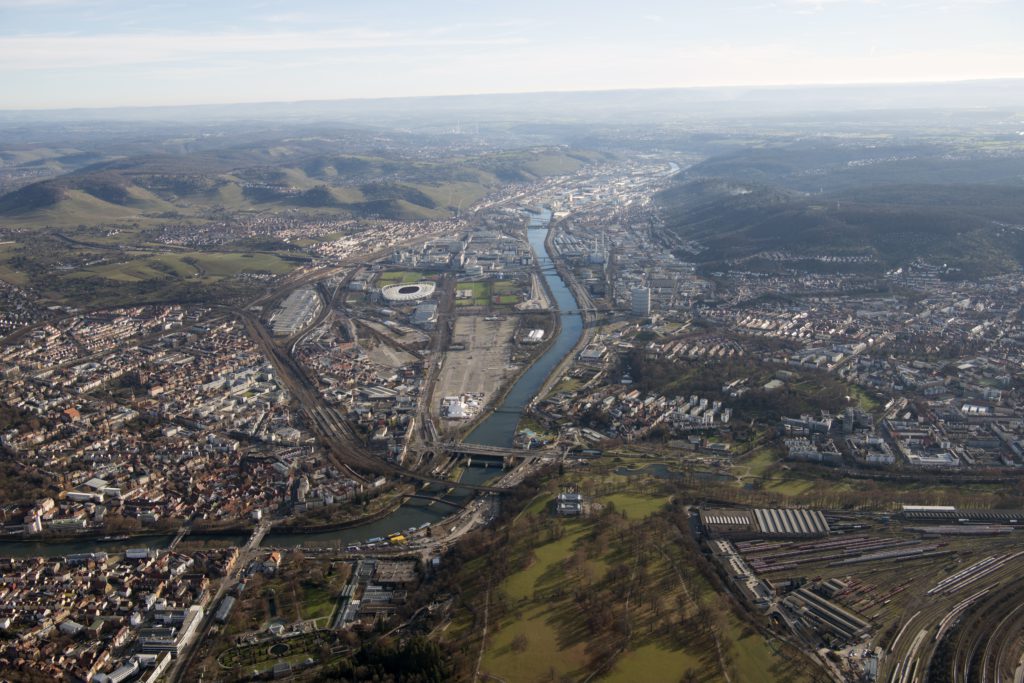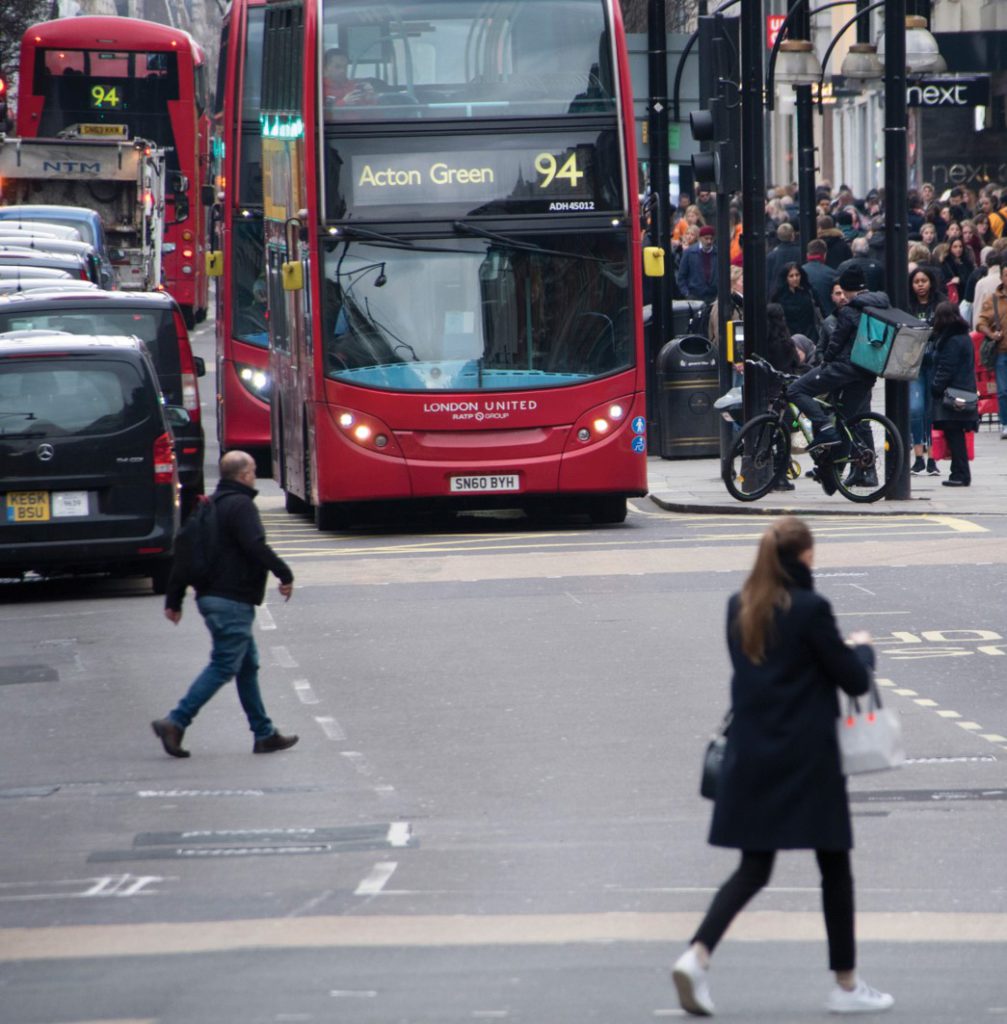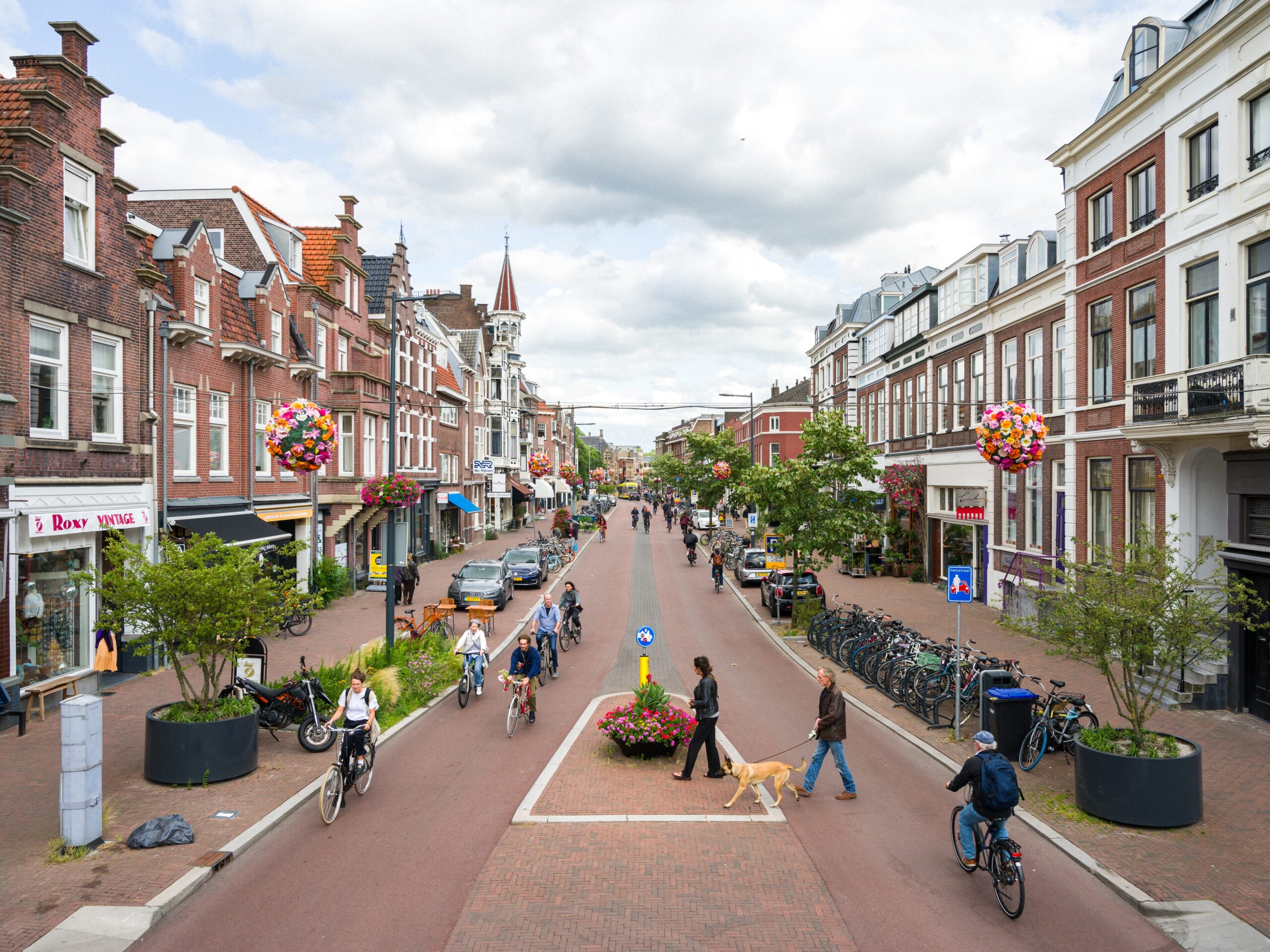Charting AND Changing the Course: Annual POLIS Conference 2024 wraps up
The second and final day of the Annual POLIS Conference 2024 brought together hundreds of mobility experts, policymakers, and practitioners to celebrate sustainable urban mobility achievements and address the most pressing transport challenges.
The event, co-hosted by POLIS, Baden-Württemberg, the City of Karlsruhe, and Messe Karlsruhe, has reaffirmed its status as Europe’s leading forum for advancing innovative and sustainable urban transport solutions.
Following the last round of Parallel Sessions, the Closing Plenary session ‘Charting or Changing the Course’ provided an impactful conclusion to the conference, featuring high-level discussions on the urgency of maintaining and accelerating the transition to sustainable urban mobility amidst complex global challenges.
Changing AND Charting

Herald Ruijters - Credits: Foto Behrendt
The session was moderated by POLIS Secretary General Karen Vancluysen and opened with a speech by Herald Ruijters, Deputy Director General of DG MOVE at the European Commission. Ruijters praised Karlsruhe’s commitment to sustainable mobility, highlighting its cross-border collaboration with France. Travelling by train, he observed infrastructure projects promoting connectivity across transport modes, aligning with EU goals for sustainable and collective transport.
‘Transport is not just about moving people; it connects economies, lives, and societies,’ Ruijters remarked, emphasising the role of stability in uncertain times. He called for reinforcing key initiatives like Fit for 55 while addressing the inclusion of Ukraine and the Balkans in mobility frameworks, a reflection of shared European values: ‘Their cities belong on our map. Fighting for freedom and European values, they will participate in mobility plans, reflecting the connectivity that unites us all.’.
Ruijters underscored the importance of urban nodes, describing them as ‘the backbone of future mobility strategies.’ With a growing network of 431 cities—soon expanding to 500—these hubs symbolise local implementation driving a broader European vision.
Reflecting on the theme of the plenary, Ruijters affirmed: ‘We are not just changing; we are charting and reinforcing a determined path forward.’ He stressed the necessity of long-term planning, sustainable investments, and stronger cooperation between cities, regions, and the European Commission.
Remembering our collective ‘Why’

Lars Strömgren - Credits: Foto Behrendt
Keynote Lars Strömgren, Vice-Mayor for Transport and the Urban Environment, sees Stockholm as a beacon of sustainability and inclusivity—a vision rooted in memories of exploring the city on his grandmother’s bike as a child.
‘I am sure most of you have a memory of how you first discovered your own cities,’ he addressed the crowd. ‘I cherish my inner child’s perspective to guide me in shaping Stockholm’s present and future. My goal is to make the city green, liveable, and child-friendly. And my “why”—my reason—is because it is worth doing, and doing well, despite opposition, so that Stockholm’s citizens can experience the city with the joy of a child.’
Stockholm’s sustainability efforts are ambitious. From introducing congestion charges in 2007 to launching a forthcoming Zero-Emission Zone (ZEZ), the city has consistently prioritised pedestrians, cyclists, and public transport. Strömgren also highlighted innovative logistics solutions, such as consolidating goods deliveries and combining freight with waste collection, which reduce urban traffic and reclaim public spaces.
Addressing resistance to policies, Strömgren emphasised the importance of dialogue and adaptive solutions. ‘The cost of not acting will be much higher than doing what we can now,’ he urged. He underscored the critical role of cities in addressing climate change, including the risks of flooding and heat waves. ‘We, as citizens, must recognise that we will bear the consequences of climate change. We need to engage with the EU and explain why cities are central to tackling these challenges—For this reason, platforms like POLIS are essential for amplifying urban voices.’
Despite facing opposition, Strömgren remains optimistic. ‘No matter how many angry emails you receive, a silent majority supports what you are doing. Remember your “why,” and stay the course,’ he concluded.
Cities against the tide
Moderated by Karen Vancluysen, the Plenary proceeded with an engaging panel debate.

Eva Oosters - Credits: Foto Behrendt
Eva Oosters, Deputy Mayor for Zero-Emission Mobility at the City of Utrecht, opened by highlighting the precariousness of aligning city and national priorities: ‘Our ambition to enforce zero-emission zones for urban logistics has been a ten-year journey, but recent elections brought a government that does not necessarily share the city’s mission. It shows how fragile decision-making can be.’ Still, she called the EU Cities Mission a ‘blessing in disguise,’ pointing out its role in revealing blind spots and fostering collaboration.
Seb Dance, Deputy Mayor for Transport for London, echoed this, citing optimism (with a grain of salt) under London’s new government: ‘We are fortunate to have a developed transport authority aiming to boost active travel and public transport nodes, but we know things can change for the worse very quickly.’ Elke Zimmer, State Secretary for Transport for the State of Baden-Württemberg, addressing the region's ambitions noted: ‘We aim for climate neutrality by 2040, with two Mission cities and more aspiring to lead. We encourage cities to look beyond silos—not just at mobility but its social impacts, like health and democracy. Mobility is fundamental to democracy because it enables people to connect.’
She highlighted climate bonus funding for cities, incentivising sustainable mobility plans akin to SUMPs (Sustainable Urban Mobility Plans), while warning of political uncertainties: ‘If conservatives win the next elections, we might step back from guarantees for sustainable mobility. The future feels quite uncertain’

Tomislav Tomašević - Credits: Foto Behrendt
Tomislav Tomašević, Mayor of Zagreb, stressed the need for direct European funding, highlighting national bottlenecks: ‘Cities could speed up progress if we had direct EU access. Delays caused by national processes can be frustrating.; Discussing Zagreb’s ambitious transformation, he said: ‘We are moving from a neglected public transport system to climate neutrality by 2030, investing in 80 new trams and electrifying our fleet. But we need more support.’ Dance emphasised the risks of underfunding: ‘If you do not fund networks, they deteriorate. People lose trust and switch back to cars.’ Janet Horner, Councillor of the City of Dublin, also raised concerns about the Social Climate Fund (SCF), advocating for funding to reach cities and regions directly: ‘It is not just about transport but ensuring member states support inclusive planning.’
We cannot leave anyone behind
Tomašević reaffirmed Zagreb’s commitment to combining sustainability with social justice: ‘Our vision is to brand Zagreb as a Climate Mission City and the capital of social inclusion. This year, we extended free public transport, subsidising 85% of costs from the city budget. A socially just green transition is the only path forward—we cannot leave anyone behind.’

Janet Horner - Credits: Foto Behrendt
Horner agreed on the importance of fairness, highlighting transport’s multifaceted benefits: ‘Transport has a strong economic, health, and climate case.’ Yet, she noted challenges: ‘At the city level, we hear claims that cycling is “elitist.” The evidence shows the opposite: better transport systems enable more people to participate in public life, strengthening cities.’
Zimmer addressed mobility poverty, describing efforts in Baden-Württemberg: ‘Mobility is key to inclusion. Everyone should have the opportunity to participate in society.’ Regional strategies include affordable youth travel tickets and consultations with vulnerable groups, such as older residents and those with disabilities. Zimmer also discussed their pedestrian strategy: ‘Walking is accessible to nearly everyone, but it requires investment in infrastructure and planning.’
Urban nodes and multimodality
The panel highlighted urban nodes and multimodality as essential for connectivity across transport networks. Tomašević outlined Zagreb’s focus: ‘We see urban nodes as opportunities to improve intercity and local connectivity. With no underground public transport, better integration with the national rail system is crucial.’ Collaboration with academia and organisations like POLIS also drives Zagreb’s multimodal efforts.
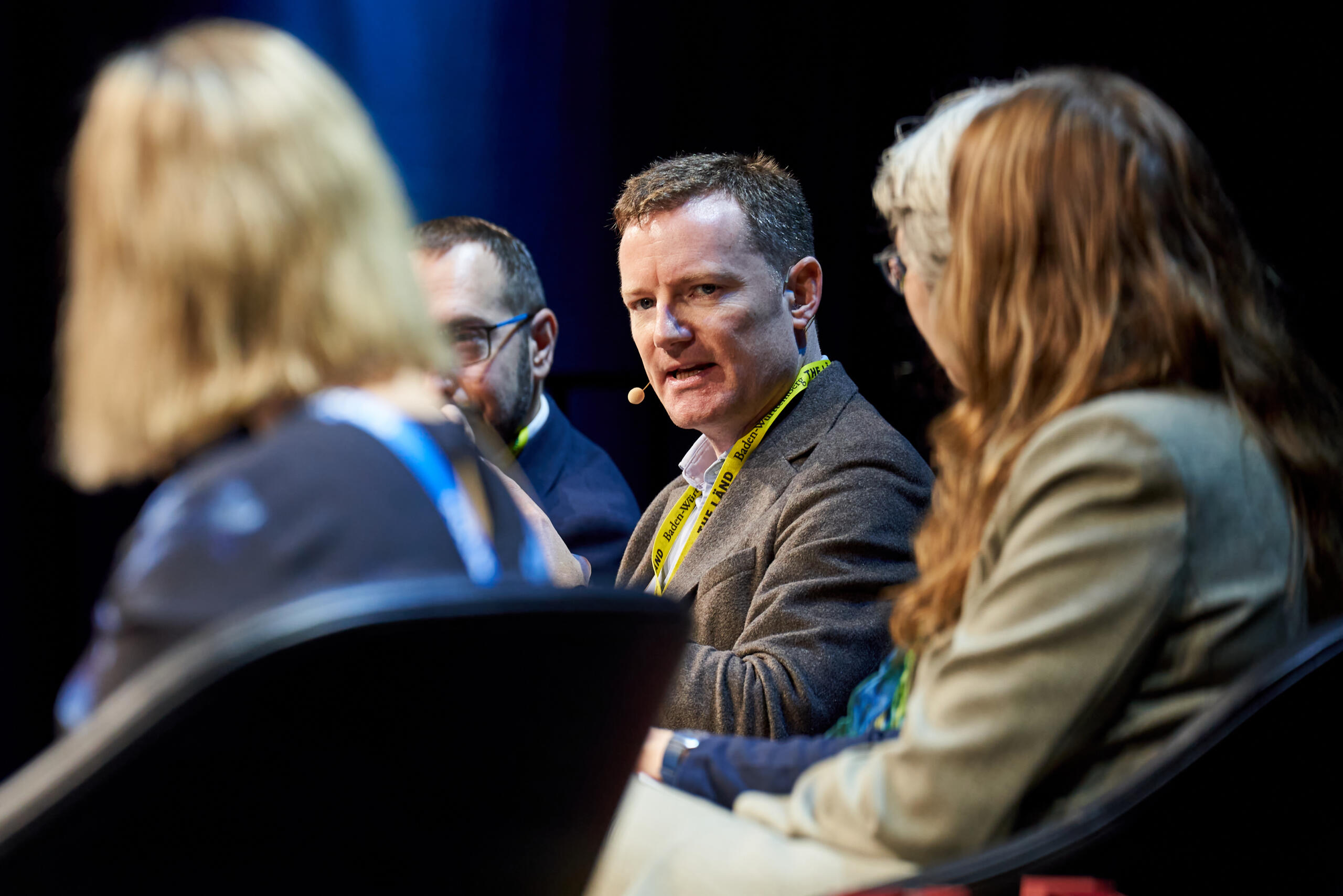
Seb Dance - Credits: Foto Behrendt
Dance spotlighted freight decarbonisation in London: ‘We aim to reduce logistics transport without reducing capacity—by consolidating and electrifying fleets.’ He underscored the importance of harmonised cross-border legislation, vital for sustaining connectivity in high-speed rail networks.
Oosters described Utrecht’s unique challenges: ‘Historic infrastructure and an outdated energy grid hinder electric vehicle adoption. We are pioneering solutions like vehicle-to-grid systems to modernise our energy networks.’ She also emphasised freight hubs as solutions to urban congestion: ‘By transitioning freight from larger boats and trucks to smaller, sustainable vehicles, we advance the energy transition.’
The wind at our back

Elke Zimmer - Credits: Foto Behrendt
Panellists concluded with a unified call for strong EU support. Oosters urged: ‘Do not water down the Green Deal! It is essential for our mission.’ Zimmer emphasised staying the course: ‘Do not stop halfway. Fit for 55 may not be perfect, but it is the right package to keep us on track—we need the wind at our back.’ Dance stressed financial backing: ‘Trust cities to spend the money well.’ Horner called for faster action: ‘Accelerate delivery—we need tangible results now.’ Together, they emphasised that ambitious goals require persistent, collaborative efforts.
Stockholm recognised as the POLIS Award Winner 2024
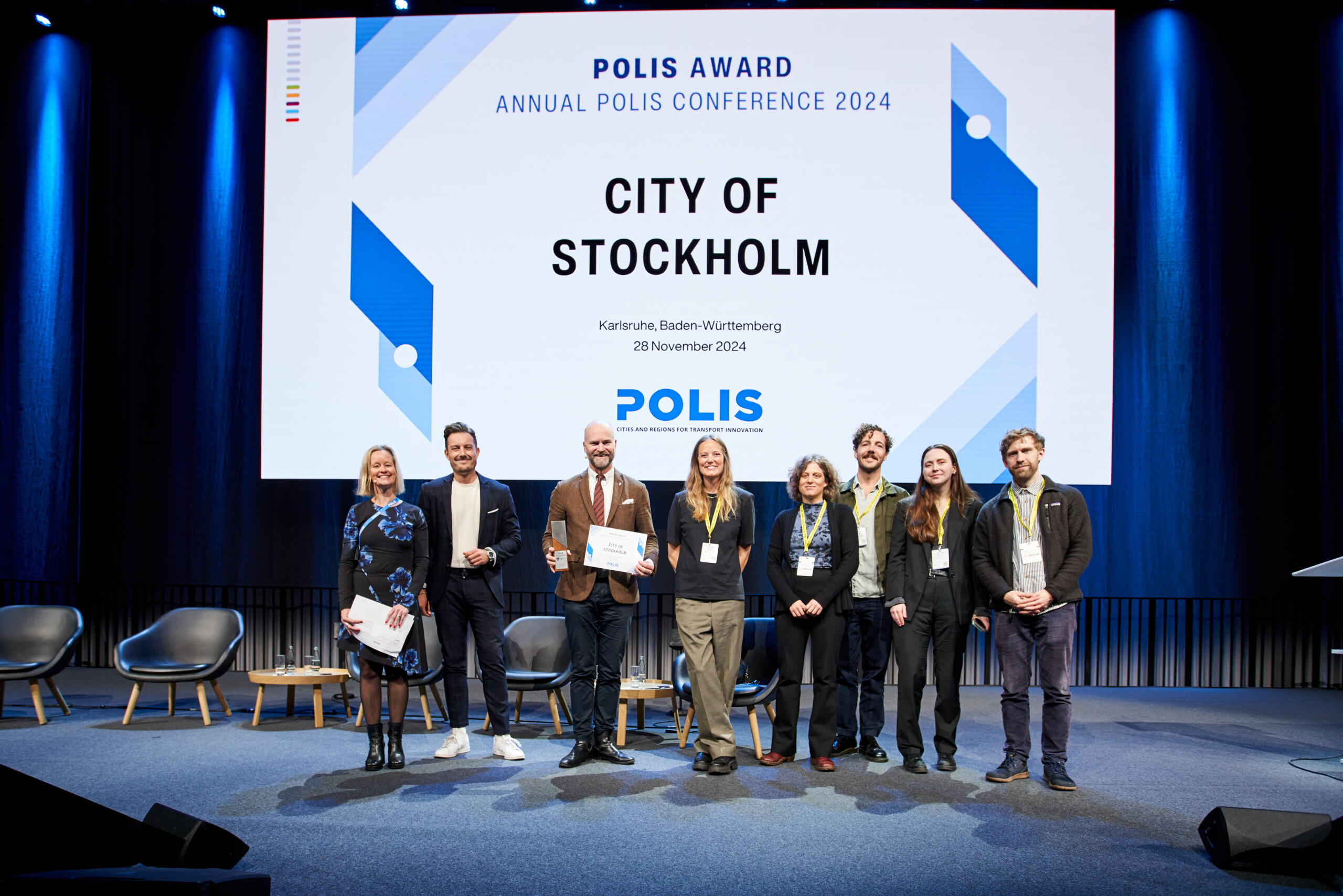
Stockholm wins the POLIS Award sponsored by FREENOW - Credits: Foto Behrendt
The announcement of Stockholm as the winner of the POLIS Award 2024 marked a highlight of DAY 2. The award, sponsored by FREENOW, celebrates Stockholm’s commitment to sustainable transport innovation and its leadership in the Climate Neutral Cities Mission.
Stockholm’s impressive achievements include:
- A robust Sustainable Urban Mobility Plan that prioritises walking, cycling, and public transport;
- Long-standing implementation of environmental zones, dating back to 1996;
- Successful congestion tax measures introduced in 2007;
- Collaborative efforts with civil society and businesses to preemptively address mobility challenges.
These initiatives have significantly improved air quality, reduced congestion, and set benchmarks for cities worldwide.
Looking ahead to the Annual POLIS Conference 2025
As the POLIS President Oosters closed the event, anticipation began building for the next Annual POLIS Conference in 2025, which the City of Utrecht will host on 26 and 27 November 2025.


